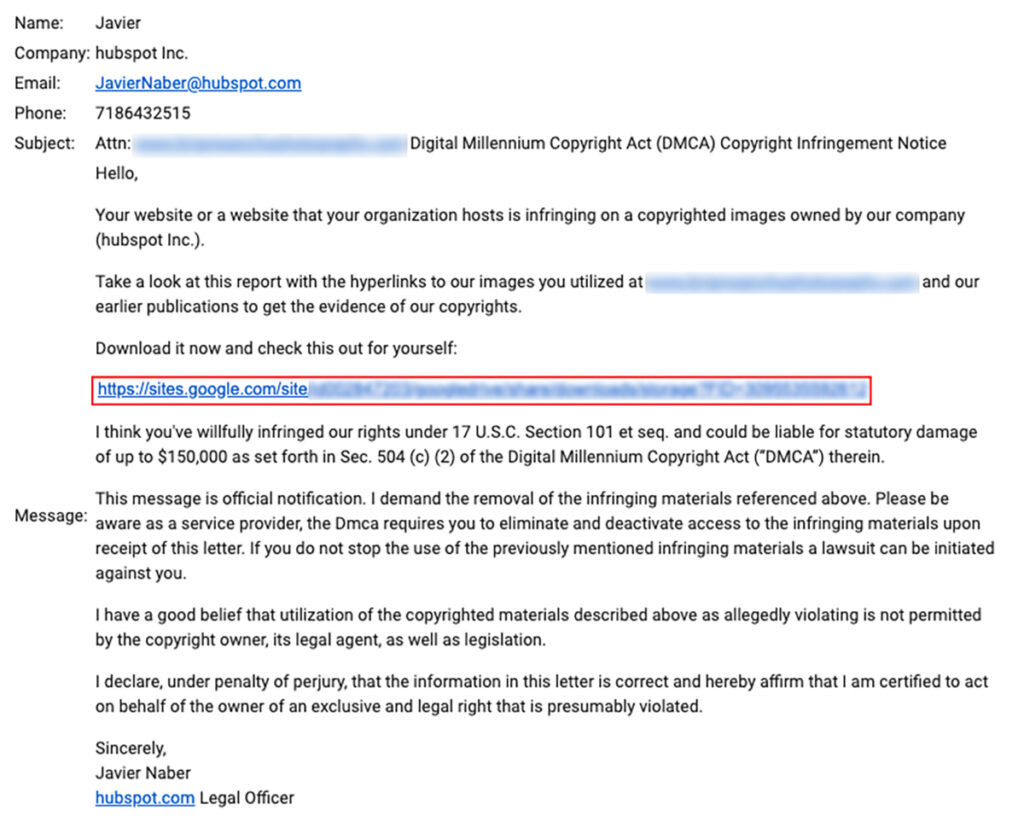
Phishing Scam: Copyright Infringement
Javier is very talented and quite popular. He is an experienced photographer and an illustrator who finds the time to email and fill out contact forms for thousands and thousands of people every day. He also uses various aliases such as: John, Juan, and Jason. Also, he is remarkably able to have hundreds of email addresses registered to his name. His emails and form submissions alert that company or individual of copyright infringement of his material. The reality is that copyright infringement exists. This person does not.
This is a phishing scam that has been floating around the internet for quite a few years already:

A phishing scam comes in the form of an email, contact form submission, social media message, or even a text. The language can be threatening and seems real. However, if you look closer you’ll see what the real goal is – to get you to click on a link. Whatever you do, DO NOT CLICK THE LINK. This is a file download that typically inserts vulnerabilities in your computer or network.
Identifying a Phishing Scam
Please know that there are several other phishing scams out there. They come in various forms and from various people. They are all hoping that you will click on a link. Here are a few steps to help you identify the next scam that hits your inbox:
- Improper grammar, misspelled words, and awkward phrasing indicates that it could be a fake message.
- Hover over a URL (DO NOT CLICK) to see where it’s actually taking you.
- Search for some of the key phrases in the email such as: “Digital Millennium Copyright Act (DMCA) Copyright Infringement Notice” or “I think you’ve willfully infringed our rights under 17 U.S.C. Section 101 et seq. and could be liable for statutory damage of up to $150,000 as set forth in Sec. 504 (c) (2) of the Digital Millennium Copyright Act (”DMCA”) therein.” If it’s a scam, most of the time you’ll find others posting about it.
Identifying and deleting the threat is only one defense. Making sure your security software is up-to-date on your computer and mobile device will also help. Don’t open attachments from senders you do not know.
Have you clicked on a link or responded to a phishing attempt? Report them to the FTC.
Don’t take the bait. Protect yourself and your company from scams! The internet is a beautiful and scary place. Stay smart and aware that even the simplest of scams can cause the biggest trouble.

Naomi Dhillon is an Account Manager/Multimedia Specialist at Stanton Street, a web design and development company in El Paso, TX. Naomi has worked at Stanton Street since 2010 and has over 25 years of project and client management experience in the multimedia realm.
About Stanton Street
We help organizations amplify their online presence by building engaging websites, creating successful digital marketing campaigns, and tackling the $%^#/, so they can build their brand, grow their business, and reach their full potential.